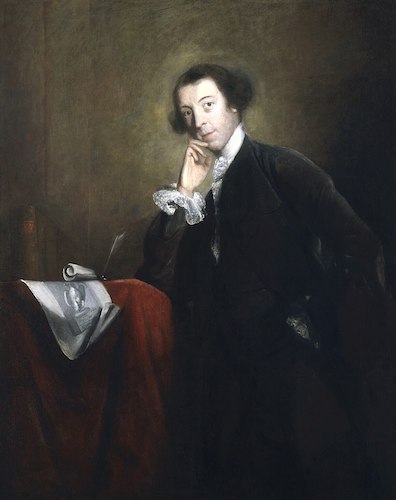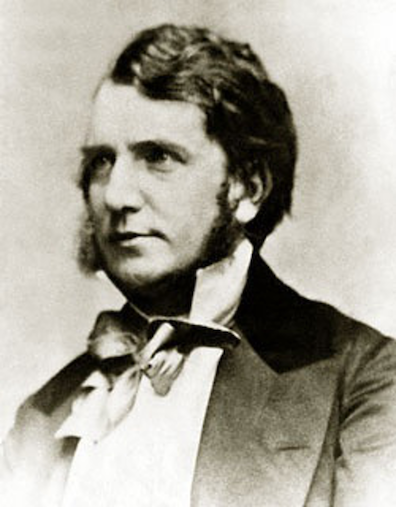So-called Gothic novels drew inspiration from medieval
buildings (especially castles and monasteries) thought to
contain hidden passageways, underground rooms, battlements
exposed to the elements, trapdoors and sliding panels,
self-closing doors, and the like. These novels had elaborate
unrealistic plots and they typically wove an atmosphere of
mystery, terror, and the supernatural. The Castle of
Otranto, which kicked off the fad, draws on
Shakespeare's story of Hamlet and the ghost stalking the
labyrinth of Elsinore, a fact that probably accounts for
Joyce's decision to include "a phial marked Poison,"
the sentence "For this relief much thanks"
(from the scene of the sentries on the battlements), and
references to the Hamlet theory that Stephen has
delivered in Scylla and Charybdis.
In the novel a giant ghost stalks a castle belonging to the
violent prince Manfred. Early in the novel Manfred finds his
son Conrad crushed to death by a huge helmet, and at the end
he is forced to relinquish his unjust reign, an action met by
the ghost's approval. In Gifford's view "Haines plays the part
of Manfred, the bloodstained usurper," no doubt because Haines
identifies himself as Samuel Childs, the man charged with
murdering his brother Thomas: "The mystery was unveiled.
Haines was the third brother. His real name was Childs."
But Haines also seems to play the part of the ghost that
stalks the castle of Otranto. As they open doors and enter
rooms in the labyrinthine structure, characters in Walpole's
novel are terrified to see parts of the specter's massive
body, an experience which Joyce reproduces: "The
secret panel beside the chimney slid back and in the recess
appeared... Haines!"
Walpole's narrative style does not much resemble Joyce's
overblown prose, though sentences like "The company were
struck with terror and amazement" do cohere with it. For
stylistic inspiration, it seems, one must jump a century ahead
to Le Fanu's The House by the Churchyard. Set in
Chapelizod, this novel has become well recognized as a source
for Finnegans Wake, but it also seems to inform the
paragraph in Oxen. Its title is echoed in Joyce's
evocation of the Childs house next to the Glasnevin cemetery
("The lonely house by the graveyard is uninhabited"),
and its story includes a ghostly visitation and a murder, as
in Walpole's novel. However, its principal influence on Joyce
appears to be stylistic.
Although Robert Janusko does not document any phrases from Churchyard
that Joyce jotted down in notebooks and echoed in Oxen
(nor does he do so for Walpole's novel), a simple scanning of
words reveals that nearly every important word of Joyce's
paragraph appears in Le Fanu's novel, some of them quite
frequently:
But Malachias' tale (43) began (78)
to freeze them with horror (40). He conjured
(2, "conjure" 3, "conjured up" 2) up the scene (12) before
them (2, as a phrase). The secret (59) panel
(3) beside the chimney (9) slid (4) back and
in the recess appeared (29)... Haines! Which of us did
not feel (26) his flesh (10) creep
(1)! He had a portfolio full of Celtic (4) literature
in one hand, in the other a phial (1) marked
(2) Poison (13). Surprise (15), horror
(40), loathing (2) were depicted on all faces
(17) while he eyed (14) them with a ghastly
(9) grin (32). I anticipated (2) some such reception
(3), he began (78) with an eldritch laugh
(31), for which, it seems, history (32) is to blame
(9). Yes, it is true (78). I am the murderer
(7) of Samuel Childs. And how I am punished! The inferno has
no terrors (4, "terror" 21) for me. This is the appearance
(6) is on me. Tare (2) and ages (2), what way
would I be resting (3) at all, he muttered
(23) thickly (5), and I tramping (1) Dublin this
while (1, as a phrase) back with my share (10)
of songs (14) and himself after me the like
(10, as a phrase) of a soulth or a bullawurrus? My hell
(9), and Ireland's (32), is in this life (2,
as a phrase). It is what I tried (21) to obliterate
my crime (9). Distractions, rookshooting, the Erse language
(12) (he recited some), laudanum (4) (he raised
(19) the phial (1) to his lips (21, as a
phrase)), camping out. In vain (3, as a phrase)! His spectre
(1) stalks me. Dope is my only (1, as a phrase) hope
(69)... Ah! (10) (The black (116) panther!
With a cry (21, "cried" 117) he suddenly (51,
"sudden" 64) vanished (11) and the panel (3) slid
(4) back. An instant (19) later (12) his head
(216) appeared (29) in the door (364) opposite
(19) and said: Meet me (1, as a phrase) at Westland
Row station at ten past eleven (2, as a phrase). He
was gone (3, as a phrase). Tears (24) gushed
from the eyes (211) of the dissipated (1) host
(5). The seer raised (19) his hand (299) to heaven
(38), murmuring (4): The vendetta of Mananaun! The sage
(7) repeated (31): Lex talionis. The sentimentalist is
he who would enjoy without incurring the immense (3)
debtorship for a thing done. Malachias, overcome (1)
by emotion (4), ceased (7). The mystery
(19) was unveiled. Haines was the third brother (36).
His real name was Childs. The black (116) panther was
himself the ghost (21) of his own father. He drank
(20) drugs to obliterate. For this relief (12) much
thanks. The lonely (18) house (261) by the
graveyard is uninhabited. No soul (68) will live
there (1, as a phrase). The spider pitches her web
(3) in the solitude (11). The nocturnal rat
(3) peers from his hole (9). A curse (52) is
on it. It is haunted (20). Murderer's (7) ground
(45).
Of course some of these words and phrases are commonplace and
may occur in both texts by coincidence. But the overlap is
staggering, and the number of times things like blackness,
muttering, hope, horror, sudden occurrences, vanishings,
cries, and mystery recur in Le Fanu's novel suggests
that Joyce probably had it rattling about in his head
long before he started writing the Wake. Occasional phrases
leap the intertextual gap more or less intact––Le Fanu writes
about a "ghastly smile" and a "frightful grin," while Joyce
mentions a "ghastly grin"––and Le Fanu's sentences
collectively create a recognizable atmosphere. They whisk
characters on and off the stage: "Two or three minutes later,
the hall-door of Sturk's mansion opened wide, and the figure
of the renowned doctor from Dublin, lighted up with a candle
from behind, and with the link from before, glided swiftly
down the steps, and disappeared into the coach with a sharp
clang of the door." They erupt in melodramatic sentiments:
"Then the good doctor told them that the blood of the murdered
man cried to heaven." They relish the experience of horror:
"I, who thirsted more for that tale of terror which the old
soldier had all but begun..."



